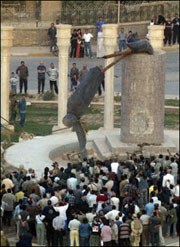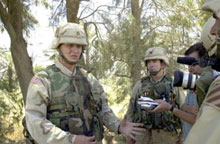|
Chaos,
Cholera, Killings Month After Iraq Liberation: Report
 |
|
One
month after, Iraqis leading a better life?!
|
BAGHDAD,
May 9 (IslamOnline.net & News Agencies) - Exactly a month has
elapsed since the toppling of the statue of Saddam Hussein in the
center of Baghdad confirmed that the Iraqi capital and the regime had
fallen. Since then the country has seen an extraordinary
redistribution of wealth, in which many thousands of impoverished
Iraqis have embarked on a round-the-clock looting spree, a British
daily reported Friday, May 9.
The
Independent touched upon the
continued failure to impose law and order on the streets of many Iraqi
towns and cities, adding that was drawing harsh criticism.
"The
last month has been pretty catastrophic in terms of building a new
government," the paper quoted Peter Galbraith, a former U.S.
ambassador who has spent the last three weeks in Iraq, as saying.
"The
authority of the occupying power of the United States was very much
diminished by this orgy of looting and destruction," he added.
The
lawlessness continues. An American soldier on Thursday, May 8, was
shot dead in broad daylight by an Iraqi who approached him with a
pistol. U.S. forces exchange fire with armed Iraqis almost daily
across the country.
Citing
some small successes, such as recovering thousands of manuscripts and
hundreds of artifacts missing from the National Museum, the paper
touched upon the rapidly deteriorating public health system of Iraq,
as is most worrying failure, especially with summer temperatures
taking hold.
After
a month of occupation, the health system remains in a state of
collapse. Drinking water, from the Tigris and Euphrates rivers,
contaminated with sewage, has caused outbreaks of cholera and typhoid
among children in Basra.
And
the World Health Organization warned Thursday that unless the security
situation improves and medical staff can work in safety, the cholera
outbreak could become an epidemic.
The
U.S. forces make sporadic efforts to stop the tide of looters - for
instance, by occasionally throwing some people out of their new -
stolen - riverside homes, and by detaining young looters for a few
hours to scare them. But the effects are limited.
On
Thursday, American soldiers were sunning themselves behind a barrier
of razor wire beside the city's main bus station. They and their
Bradley fighting vehicle were less than 100 yards from the new
"thieves' market" in al-Maydan Square, where looters gather
to sell their spoils.
Bullets
and magazines for Kalashnikovs were openly on sale. You could buy a
stolen door for £4.40. Six pence will secure you a stolen floppy disc
which - according to the labels - contains the accounts of Amoco Oil's
operations. Someone fired a pistol; the Americans did not react, and
nor did the crowd.
When
the U.S. forces first invaded, as Iraq ministries burned before the
eyes of the occupying forces, building after building was stripped to
its bones as if attacked by a shoal of human barracudas. Now the
epidemic of thieving is less intense, but still continuous, the paper
said.
U.S.
Failure In Iraq
 |
|
Like
it or not, U.S. forces are an occupation force in Iraq
|
Stressing
the same message, the New York Times Thursday attacked
the U.S. administration's management of postwar Iraq.
In
an editorial headlined "Free fall in Iraq," the major daily
said "it is too soon for definitive judgments. But it is not too
early to say that the first few weeks of American occupation under the
leadership of Jay Garner, a retired army lieutenant general, have left
a great deal to be desired."
"Lines
at the gasoline pump in Iraq now last up to three days. Electricity,
needed for water and refrigeration units, flickers on and off.
Uncollected garbage rots in the hot streets.
"An
outbreak of cholera was reported yesterday in Basra," the daily's
editorial board wrote.
"The
current chaos is less a result of fresh war damage, which was
relatively limited, than of the Bush administration's failure to plan
for replacing a regime that had long ordered every detail of Iraqi
life," it added.
In
one of its most damning statements, the daily wrote that "few
Iraqis are feeling nostalgic for the sadistic terror of Saddam
Hussein. But in the bad old days, basic services were more
dependable." It noted that diarrhea in young children was on the
rise and hospitals were scraping by after having their drugs and
equipment stolen by looters.
"Like
it or not, the United States is now the legally responsible occupying
power in Iraq," the Times said. "As such, it
is required to protect the security, health and basic well-being of
the Iraqi people."
|